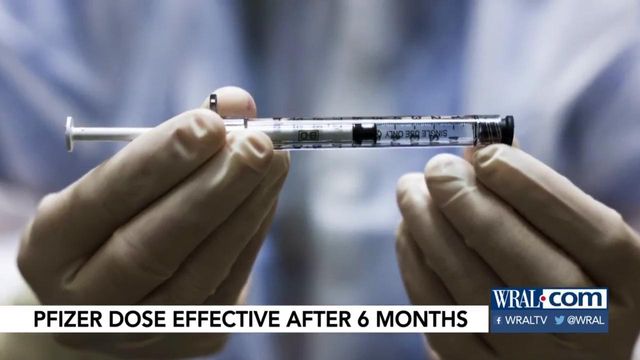"It's looking like the Energizer Bunny:" Pfizer vaccine remains highly effective after 6 months
The ongoing Phase 3 clinical trial of Pfizer/BioNTech's coronavirus vaccine confirms its protection lasts at least six months after the second dose, the companies said Thursday.
Posted — UpdatedInitially, vaccine immunity was only promised for three months. Now that number is at least six months.
While the six months sounds like a very short period of time for immunity, doctors and scientists say the Pfizer vaccine has only been studied a short time, and they believe the length of immunity will only continue to grow.
Jessica Dixon, an Infectious Disease Specialist at WakeMed said, "They're now saying, 'Hey, look, it's still effective at the six month mark.' So hopefully we will see in another three months, data might come out that says it's effective for nine months."
"We don't see an end in sight," said Dr. David Wohl from UNC, "As more people are followed longer, we get to find out how well the vaccine works over time."
"Right now, It's looking like the Energizer Bunny," he said.
People who have had the vaccine are encouraged by the study.
Sophia Lopez, who has gotten the first dose of the Pfizer vaccine, said, "I feel like probably based on some other research that it could be a longer immunity."
Other positive news coming out of the study: It was tested on variants like the one in South Africa, and it proved to be effective.
A closer look at the trial measuring Pfizer vaccine's efficacy
The ongoing Phase 3 clinical trial of Pfizer/BioNTech's coronavirus vaccine confirms its protection lasts at least six months after the second dose, the companies said Thursday.
The question of how long vaccine protection lasts can only be answered once enough time has passed, and while six months of protection is a modest target, it's longer than previously known. The study is continuing and future updates may reveal more about how long and how strong this protection is.
The vaccine remains more than 91% effective against disease with any symptoms for six months, the companies said. And it appeared to be fully effective against the worrying B.1.351 variant of the virus, which is the dominant strain circulating in South Africa and which researchers feared had evolved to evade the protection of vaccines, the companies said.
"The vaccine was 100% effective against severe disease as defined by the U.S. Centers for Disease Control and Prevention (CDC), and 95.3% effective against severe COVID-19 as defined by the U.S. Food and Drug Administration (FDA)," Pfizer and BioNTech said in a joint statement.
On Wednesday, the companies said a small trial of volunteers aged 12 to 15 showed 100% efficacy in that age group.
"These data confirm the favorable efficacy and safety profile of our vaccine and position us to submit a Biologics License Application to the U.S. FDA," Albert Bourla, Pfizer's chairman and chief executive officer, said in a statement. A BLA is an application for full approval. The vaccine currently has emergency use authorization, EUA, which falls short of full approval.
"The high vaccine efficacy observed through up to six months following a second dose and against the variant prevalent in South Africa provides further confidence in our vaccine's overall effectiveness."
The company has been studying the vaccine in more than 46,000 volunteers and has noted 927 cases of confirmed Covid-19.
"From the 927 confirmed symptomatic cases of COVID-19 in the trial, 850 cases of COVID-19 were in the placebo group and 77 cases were in the BNT162b2 group, corresponding to vaccine efficacy of 91.3%," it said.
"Thirty-two cases of severe disease, as defined by the CDC, were observed in the placebo group versus none in the BNT162b2 vaccinated group, indicating that the vaccine was 100% efficacious in this analysis against severe disease by the CDC definition. Twenty-one cases, as defined by the FDA, were observed in the placebo group versus one case in the BNT162b2 vaccinated group, indicating 95.3% efficacy by the FDA definition."
These definitions matter. The FDA's definition of severe disease included a raised respiratory rate indicating respiratory distress; raised heart rate, an oxygen saturation level of 93% or lower; respiratory failure severe enough to need additional oxygen or ventilation; a blood pressure drop indicating shock; significant kidney, liver or neurological dysfunction, admission to an intensive care unit or death.
CDC's definition includes a blood oxygen level of 94% or lower and an x-ray finding of lung infiltrates -- an indication of pneumonia -- of greater than 50%
The most common adverse events were pain at the injection site, fatigue and headache.
"In South Africa, where the B.1.351 lineage is prevalent and 800 participants were enrolled, nine cases of COVID-19 were observed, all in the placebo group, indicating vaccine efficacy of 100%," the company said.
"Vaccine safety has now been evaluated in more than 44,000 participants aged 16 years and older with more than 12,000 vaccinated participants having at least six months of follow-up after their second dose."
Related Topics
• Credits
Copyright 2024 by WRAL.com and CNN. All rights reserved. This material may not be published, broadcast, rewritten or redistributed.





